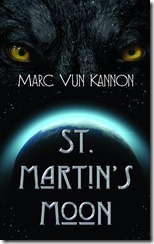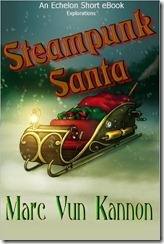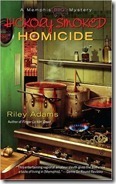Elizabeth Spann Craig's Blog, page 189
November 9, 2011
How And Why I Changed My Book's Title—by Marc Vun Kannon
@AuthorGuy -- Authorguy's Blog
What a difference a Date makes.
When I first started my latest novel (the latest one to be released, not my WIP) I was standing in a book store, looking at the spine of a book with the title Blood Moon. I say 'started' here because just looking at this title gave me the idea for a novel in which a werewolf attack occurs on the Moon. The story as originally envisaged in that flashbulb moment, that 'Aha' moment for which all of us writers live, was supposed to be a mystery, with a hideous monster in the middle of it.
 When I started actually writing the story, the title was (you guessed it) 'Blood Moon'. Hey, why not, can't copyright titles, right? Well, no, you can't, which is not always a good thing. We want our books to stand out, don't we? We want people to find our books, don't we? Well, have you ever tried googling the title 'Blood Moon'? There are lots of books with that name. It's really rather shocking. I hope the authors had better names for their books, but it's amazing that so many publishers couldn't be bothered to check! I suppose there might be title generators or SEO algorithms that recommend titles with Blood and Moon in them, but if you want that book to shine don't hide it under a bushel of other books with the same name.
When I started actually writing the story, the title was (you guessed it) 'Blood Moon'. Hey, why not, can't copyright titles, right? Well, no, you can't, which is not always a good thing. We want our books to stand out, don't we? We want people to find our books, don't we? Well, have you ever tried googling the title 'Blood Moon'? There are lots of books with that name. It's really rather shocking. I hope the authors had better names for their books, but it's amazing that so many publishers couldn't be bothered to check! I suppose there might be title generators or SEO algorithms that recommend titles with Blood and Moon in them, but if you want that book to shine don't hide it under a bushel of other books with the same name.
When I was in the middle of writing my story, I grew dissatisfied  with the title. It seemed rather ordinary to me, and more important, it didn't actually tell me anything about the book. Worse, what it did tell me was wrong! You see, Blood Moon didn't stay a mystery very long. I think I was in chapter two somewhere when I realized that I had no aptitude for writing mysteries. Or Horror. I'm a character-based novelist, and I usually discover the plot as I'm following my characters around. Blood Moon is a great title for a mystery (or a paranormal, or a romance, or a...) but it's not a great title for whatever this story was shaping up to be.
with the title. It seemed rather ordinary to me, and more important, it didn't actually tell me anything about the book. Worse, what it did tell me was wrong! You see, Blood Moon didn't stay a mystery very long. I think I was in chapter two somewhere when I realized that I had no aptitude for writing mysteries. Or Horror. I'm a character-based novelist, and I usually discover the plot as I'm following my characters around. Blood Moon is a great title for a mystery (or a paranormal, or a romance, or a...) but it's not a great title for whatever this story was shaping up to be.
Sometimes we authors realize it ourselves, and change the title to something more useful. Sometimes we don't, and it falls to the editors and even marketing people to say that our book just doesn't feel like a 'Blood Moon' sort of book, and then where are we? The title influences the book as we're writing it, at least it does for me. As Blood Moon moved farther away from anything mystery-like, the name became more of a straitjacket. So I went on the web, googling the phrase 'Blood Moon' to see if there were any useful alternatives. It turns out there are. Blood Moon is an actual name, the name of a particular full moon, one of the 13 that occur throughout the year. It never occurred to me that people would name them but they do. (Possible series idea there.)
One of those names was 'St. Martin's Moon'. So I thought, 'Hey, sounds like a cool title', but it was much more than that. St. Martin is the patron saint of many things, including beggars, innkeepers, and geese. More important, St. Martin's Moon is the full moon in the sky shortly after Halloween. And here's me, writing a werewolf novel.
And just like that (well, not really, nothing about this book was 'just like that') the book got a bit of a makeover.Some details got a whole new significance. Because of the title, the time and place of events suddenly shifted. It's Halloween, and I discovered Joseph Marquand, my MC, hates Halloween. Why? Well, let's find out.
Some details were added. Because of the title, I noticed a church sign one day and worked it into the story. Minor, I'll admit, but good for flavor if nothing else.
When I got around to writing the end (I'm very linear) I found that the whole ending had been changed. I discovered Joseph Marquand didn't like psychics either, but that's for next book.
Even the genre was different, and I don't say that lightly. I didn't just change the genre from mystery to paranormal romance, although for a long time that's what I thought I'd done. I ended up inventing a new genre, because the story morphed to fit the title.
The Feast of St. Martin is November 11th. St. Martin's Moon is November 10th this year. My wife is planning a party, just because.
Happy Martinmas!
 Like many writers, I started when a story came along and decided that I should write it. Don't ask me why. Others followed, until now I'm afraid to go out of the house with a recorder or notebook in my hand. But I show them, I refuse to write the same story twice!
Like many writers, I started when a story came along and decided that I should write it. Don't ask me why. Others followed, until now I'm afraid to go out of the house with a recorder or notebook in my hand. But I show them, I refuse to write the same story twice!
*********************************
8 Ways Writers Cause Trouble
 Hi everyone! Today I'm over at the book blog, Escape With Dollycas Into A Good Book. I've got a guest post explaining why it's dangerous to unleash writers on an unsuspecting public. :)
Hi everyone! Today I'm over at the book blog, Escape With Dollycas Into A Good Book. I've got a guest post explaining why it's dangerous to unleash writers on an unsuspecting public. :)
There's also a giveaway of one copy of Hickory Smoked Homicide.
Hope you'll pop by!
November 7, 2011
Why Moving On is a Good Tactic
First of all, thanks to Mason Canyon at the Thoughts in Progress blog for her review of my recent release, Hickory Smoked Homicide. I appreciate it, Mason!
 I was talking to another writer the other day and they asked me how I handled the pressure of promo and reviews. I thought about it for a second, then I said, "I write."
I was talking to another writer the other day and they asked me how I handled the pressure of promo and reviews. I thought about it for a second, then I said, "I write."
But it wasn't always that way. After I wrote my first book, I treated it like a child that needed its hand held. I walked it to kindergarten, I anxiously watched what people said about it. Was it being bullied? I worried over it. I was a helicopter parent for the book.
Then I noticed that I kept getting the same advice from the other writers that I knew. "You should write another book." Some of the writers didn't even realize they were giving advice. "When's your next book coming out?" they'd ask. As if that was just the normal approach. It was, actually, an annoying refrain.
I didn't want to think about the next book. I wanted to focus on the fact that I'd just written a book! It made my head hurt to think about moving on to another one. I wanted to just celebrate my accomplishment.
Since I continued to hear the same advice, though, I wrote another book. I started obsessing over it the same way. At that time, I was trying to move from a regional press to the big guys. I wrote queries and synopses and cover letters, and tracked them carefully. And I wasn't writing.
I discovered that it was very discouraging to get rejections. That was probably because querying was my sole focus. The rejections really stung. I hated going to my mailbox.
And still I continued to hear the refrain. "So what's your next book about? What are you writing now?"
Was there no resting on your laurels in this business? Even after a couple of books?
That's when it all started clicking for me. Write, edit, submit, brainstorm, repeat. That's the cycle. That's how we get better, that's how we start a writing career, that's how we sustain a writing career--that's it.
That's how rejections and reviews won't sting. We keep writing.
If we write a real stinker? We keep writing, keep improving. We'll have a better or more successful book the next time. Or the next.
If all our writing dreams are hanging on one or two books, we'll nurse the dickens out of them. It's so much better, so much healthier, to keep being creative.
What's your next book about?
November 5, 2011
Twitterific
![Terry3_thumb[1]](https://i.gr-assets.com/images/S/compressed.photo.goodreads.com/hostedimages/1380447585i/1701687.png)
 Below are the writing-related links I tweeted last week.
Below are the writing-related links I tweeted last week.The Writer's Knowledge Base search engine, designed by software engineer and writer Mike Fleming, makes all these links searchable. Sign up for the free monthly WKB newsletter for the web's best links and interviews: http://bit.ly/gx7hg1 .
Recent news: the 3rd book in the Memphis Barbeque series released last Tuesday—Hickory Smoked Barbeque.
5 things to know about NaNoWriMo before you start it: http://bit.ly/tUC4V6 @LTWFblog
Why a 1st Draft is Like a Day at the Farm: http://bit.ly/w1UXEf @JillKemerer
Questions that helped 1 writer during revisions: http://bit.ly/rM2Kt8
A Tortured Path to Writing and Cartooning: http://bit.ly/vXBrHS
When you feel out of place, write: http://bit.ly/rQwrQX @write_practice
Try tracking your circadian cycle to see when you should write: http://bit.ly/rZ7v51 @bookviewcafe
Know the difference between meaningful soc. media interaction & spam: http://bit.ly/rTfCxn @WriteAngleBlog
How often should writers blog? http://bit.ly/tao421 @JodyHedlund
The Secret to Effortless Writing: http://bit.ly/sLKBpv @JeffGoins
Chick Lit vs. Women's Fiction: http://bit.ly/roHjrh @RoniLoren @sierragodfrey
The difference between bad press releases & good publicity requests: http://bit.ly/sTJhYb @JaneFriedman
How to nip procrastination in the bud: http://bit.ly/vNmpZU @workawesome
7 habits of successful writers: http://bit.ly/tus3ic @BTMargins
Adding Suspense To Your Post-Apocoalyptic (or any!) Novel: http://bit.ly/rvzqVM @elanaj
Thanks @druannlove ! Book Giveaway: Hickory Smoked Homicide by Riley Adams aka @elizabethscraig http://wp.me/p3nHH-1w2 /
How to Sell Low-Cost Subscriptions to Short Stories: http://bit.ly/sjN8Hp @JaneFriedman
How to Write Like a Cheesy Halloween Movie: http://bit.ly/uXXZhL @JeffGoins
Plot Building for the Character Driven Writer: http://bit.ly/tiA313 @RoniLoren
Tips for adjusting to critique group changes: http://bit.ly/s6zC0z @PBRWriter
Are Ambiguous Endings Powerful or Frustrating? http://bit.ly/tqVBLH @writeitsideways
What Makes a Good Setting: http://bit.ly/vQ63Nt @Janice_Hardy
There are benefits to letting the door swing shut on gore in our books: http://bit.ly/rC9zTF
Writing fears: http://bit.ly/t1McCs @donnacooner
Scary book writing moments--they happen to us all: http://bit.ly/tHT683
The level of truth in our fiction: http://bit.ly/sasan7 @AmySueNathan
1 writer has changed the prices on her ebooks: http://bit.ly/rOkRAj @SelenaKitt
Words of Writing Wisdom from E.B. White: http://bit.ly/u0KYqY @LindaGray_
The Wall Street Journal To Lauch eBook Best Seller Lists: http://bit.ly/vuXXgg @ebooknewser
Thanks so much, @InkyElbows ! Inkygirl Golden Cupcake Award: Writer's Knowledge Base:http://bit.ly/vp5lzC
Creative Ways To Capture Research Notes: http://bit.ly/uQ1Sjn @DaxMacGregor
The Changing Model of Publishing: http://bit.ly/tTSIXj @greyhausagency
Hunting the wild subplot: http://bit.ly/rKgH81 @sarahahoyt
Beware of Creepy, Lurking Hackers: http://bit.ly/rv950L
10 Demographic Names and Expressions: http://bit.ly/vlijIP
Candid Writing: Break Your Own Heart: http://bit.ly/trS9E5 @BTMargins
Chapter transitions and story drive: http://bit.ly/sHyGIX @JulietteWade
How to Cut the Fat from Your WIP: http://bit.ly/rzrDJO @novelrocket
9 Tips on Opening Lines & Opening Chapters: http://bit.ly/rJjBVp
5 Things Paratrooping Can Teach You About Self-Publishing: http://bit.ly/vhDhPU @TheCreativePenn
When you need to leave your agent: http://bit.ly/uvbaTq @RachelleGardner
Nanowrimo: Elements of Act Two, Part 2: http://bit.ly/rRgott @AlexSokoloff
Nanowrimo: Elements of Act Two, Part 2: http://bit.ly/rRgott @AlexSokoloff
8 Things That Can Push a Group Over to the Dark Side: http://bit.ly/uVNyVi @AnneRAllen
Style Blunders in Fiction: http://bit.ly/t41FUA @DPLyleMD
10 Fear Busters for Writers: http://bit.ly/uMyvMB @KMWeiland
3 Common Comma Conundrums Resolved: http://bit.ly/tCLWb3 @keligwyn
Author Blogging 101: Up With Comments: http://bit.ly/rv6Q0M @JFBookman
How To Get Feedback On Your Novel That Will Actually Help: http://bit.ly/sW8Rtn @BubbleCow
4 Tips for Hiring an Editor: http://bit.ly/tuqZls
How to set up an affiliate account with Barnes & Noble thru LinkShare: http://bit.ly/vU5Uk5 @HowToWriteShop
Learning to Call It "Good Enough" So You Can Grow As a Writer: http://bit.ly/td5h49 @jodycalkins
The heroism of writing: http://bit.ly/slRhiN @BookEmDonna
Bolster Your Creative Output by Activating Your "Red Zone": http://bit.ly/tkje7t @the99percent
NaNo Prep: Planning Your Novel's Ending: http://bit.ly/sAXWko @Janice_Hardy
The key to a synopsis is to forget your book: http://bit.ly/sxZAIs @nicolamorgan
Self-Publishing: A Tale of Two Cities: http://bit.ly/t1Kh6y Wall St. Journal via @PassiveVoiceBlg
Good and bad repetition in our novels: http://bit.ly/vNCYR1 @JHansenWrites
Why 1 writer doesn't use DRM on ebooks: http://bit.ly/ucmYHA @avantman42 via @JFBookman
Macro-Revision: Take It One Piece at a Time: http://bit.ly/tdkDPM @THahnBurkett
NaNoWriMo success tips: http://bit.ly/u77uyI @GoblinWriter
How to write when you aren't in the mood: http://bit.ly/tbnJJS @CherylRWrites
How to Avoid Parenting Your Characters: http://bit.ly/sFtL3l @WritersDigest
Are There More Writers Than Readers? http://bit.ly/uaXTH3 @JodyHedlund
5 Ways Barnes & Noble's New Nook Could Compete With The Kindle Fire: http://bit.ly/vXqrMx @paidContent
Author Finds Flaws In Kindle Auto Pricing: http://bit.ly/rQW6CD @ebooknewser
Websites that review indie authors: http://bit.ly/vMgWTh @dirtywhitecandy
Where do characters come from? 4 places 1 writer finds them: http://bit.ly/sqTT1h @JoanSwan
Thanks, @JoanSwan for hosting me today--& for the comment-to-win giveway: http://bit.ly/sqTT1h
Tips for tight writing: http://bit.ly/v8opCZ @LynnetteLabelle
Tips for Scoring the Book Review, Guest Post or Interview: http://bit.ly/tlO1L5 @KristenLambTX
Is Your Blog Skimable? 6 Easy Fixes to Help Readers Actually Read: http://bit.ly/uwtu3H @MarianSchembari
Quick Way To Improve Your Twitter Profile To Sell More Books: http://bit.ly/rBg0Dw @BubbleCow
Common Grammatical Mishaps: http://bit.ly/v32F3R @danyelleleafty
It's the digital age. But Amazon Publishing hasn't killed print yet. http://bit.ly/txg72U @laurahazardowen
An agent answers a question about query formatting: http://bit.ly/vnvOul @Kid_Lit
Conflict in romance: http://bit.ly/rWjnE9 @pprmint777
Romantic relationships in fantasy: http://bit.ly/t3CD3P @FantasyFaction
17 tips for writing fiction: http://bit.ly/uv8Mbc
When's the Right Time to Leave Your Big Six Publisher? http://bit.ly/uoqp23 @JaneFriedman
Blind spots that derail writers: http://bit.ly/tRdT4F @bob_mayer
Warning Signs For Large Publishers In August AAP Figures: http://bit.ly/uWp8pb @DavidGaughran
Building conflict in your novel: http://bit.ly/thMkW2 @NovelRocket
35 Troublesome Irregular Verbs: http://bit.ly/uttRh4
How not to end things: http://bit.ly/tFjHA5 @BTMargins
What catches 1 agent's interest in an initial query: http://bit.ly/rU0FeK @greyhausagency
Interesting wrap-up of the Books in Browsers conference: http://bit.ly/uqZlNT @EdNawotka #publishing
Writing A Series: 7 Continuation Issues To Avoid: http://bit.ly/sdTfnE @TheCreativePenn
A writer explains how she organizes her 3 ring writer's notebook: http://bit.ly/uQ2a53 @JulieMusil
NaNoWriMo Tip: Use the Reference Desk: http://bit.ly/ttCe40 @GalleyCat
Keywording 201-- SEO for writers: http://bit.ly/ugQCkc @emacphe
Why 1 writer selectively follows on Twitter (& why she weeds some people out): http://bit.ly/vzfFcU @NinaBadzin
Recording Audiobooks: Tales from the Padded Room: http://bit.ly/s4ctcE
Examples in crime fiction of authors who struggled to find their character's voice: http://bit.ly/rz2hNT @Mkinberg
10 tips for author branding: http://bit.ly/rVPiks @authorterryo
Catch up with this week's #publishing buzz--conferences, transmedia, & Amazon--with @Porter_Anderson for @JaneFriedman: http://bit.ly/tvI3KY
Building Your Web Presence for Authors: SEO Blogging Tips for Fun and Profit: http://bit.ly/soc2Ph @CuriosityQuills
Amazon Lending Library Available To Prime Members: http://bit.ly/rOrGG6 @ebooknewser
The Publishing Biz: Will it Break You? http://bit.ly/ucps7V
Profanity in writing: http://bit.ly/vCxHGz
Your character's actions during dialogue are important to your story: http://bit.ly/rY8BE6 @BryanThomasS
Writing and Editing Skills Critical for Entry-Level Writers: http://bit.ly/uhGxiP
The Digital Dilemma for Picture Book Publishers: http://bit.ly/umBMBz @birtle
Revising Your Novel Part 2: Character Arcs: http://bit.ly/siY7GT @LaurHarrington
How to make a 70% royalty on a 99-cent Kindle ebook: http://bit.ly/sOBHWj @rule17
How do I balance family & writing? Sometimes not very well. :) My interview with @mybookishways today: http://bit.ly/tBHeww
9 tips for writing at home: http://bit.ly/tLqPts
The $0.99 Book Price -- Is it Making or Breaking You? http://bit.ly/vfSFYD @billsonskinner
The Future is Indie: http://bit.ly/v8Rn2c @DavidGaughran
A Writer's Number One Enemy: http://bit.ly/uzeHIN @JodyHedlund
A free directory of ebook pros--for covers, editing, formatting, & more: http://tinyurl.com/3mxg5zt
Tips for writing in deep POV: http://bit.ly/ut64rW
Choosing between independent publishers: http://bit.ly/rAnFg4 @FantasyFaction
Tips for creating your own ebook cover: http://bit.ly/u5ca1s @calistataylor for @WriteAngleBlog
5 Reasons You Should Write Like a Speed Demon: http://bit.ly/w07Ue7 @pubcoach for @FriesenPress
NaNoWriMo tip: Make a Mind Map: http://bit.ly/tq585F @GalleyCat
How to make a button for your blog: http://bit.ly/tAHrfG @alchemyofscrawl
Problems and Opportunities with Kindle's Automatic Pricing: http://bit.ly/uMlT5I @selfpubreview
7 Ways to Fake It at Book Club: http://bit.ly/ueYVEX @bookriot via @PassiveVoiceBlg
How much worldbuilding should you include in your story? http://bit.ly/rAXHov @HP4Writers
The blogging cycle--how do you stay sane? http://bit.ly/tCKs5k @JamiGold
A life in writing--P.D. James (Guardian): http://bit.ly/sN31Yi
Rowling admits she considered killing Ron Weasley (Chicago Tribune): http://trib.in/vQeqge
The ups and downs of snowboarding and writing: http://bit.ly/trcuMe @Kerrie_Flanagan
Meet the Reader: The (Real) Rules of Screenwriting: http://bit.ly/w4oLZd @scriptmag
The New Midlist Writers: http://bit.ly/rM55Eb
Are Social Media Sites the New Slush Pile? http://bit.ly/tTUdw6 @pubperspectives
Tips to help you reverse direction in your story: http://bit.ly/srqlFZ @DonMaass
Different ways to hook your reader: http://bit.ly/vd5j2v @Janice_Hardy
Avoiding Common Ebook Errors: http://bit.ly/u1psxU @PassiveVoiceBlg
For NaNo--Writing Advice From History's Fastest, Most Prolific Authors: http://bit.ly/uxNd8M @TheAtlantic
How to Use Psychometric Testing to Create Believable Characters: http://bit.ly/uliaca
Interesting plot generator to brainstorm with: http://bit.ly/rWAHf5
A variety of tips on the writing craft: http://bit.ly/sofyXW @BTMargins
Crafting a great chapter 1: http://bit.ly/smfvSB
Adding conflict to your story: http://bit.ly/vdZ0dS
How People-Watching Makes You a Better Writer: http://bit.ly/sQySW6 @writeitsideways
Writing prompt resources: http://bit.ly/tB3Y5Q @CherylRWrites
Anonymous Employees Share Thoughts about Working at Amazon: http://bit.ly/t5n3MX @galleycat
Why You Should Tell the Ugly Parts of Your Story: http://bit.ly/uEalqn @JeffGoins
50 Words with the Most Whimsical Prefix: http://bit.ly/u2BKt4
The art of the novel: http://nyti.ms/vHt9AM (NY Times)
Writing--before & after technology & before & after baby: http://bit.ly/v6pz55 @annemazer
Sometimes our stories have seeds of doubt--it's up to us to turn the soil: http://bit.ly/vF3zz2
Top techniques for ebook promo, pricing, & long term sales: http://bit.ly/ss9U0m for @TheCreativePenn
How to Get Great Endorsements that Sell Books: http://bit.ly/rKLcs7 @TonyEldridge
The Benefits of Book Reviewing: http://bit.ly/u4Udxg @lydia_sharp
Tips for developing your writing voice: http://bit.ly/sS52sU @KristenLambTX
Ghostwriting: Does It Matter If You Don't Get The Credit? http://bit.ly/uuDUp4 @shurleyhall
Why Bloggers Should Be Stalkable: http://bit.ly/w3aPqu @charissaweaks
5 Ways to Stay Motivated While Writing a Novel: http://bit.ly/sU8JHo @nathanbransford
Speaker Tips for Authors: http://bit.ly/uuMjxN @sparrowgrp for @Bookgal
50 Quick, Dirty, and Cheap Ways to Improve Your Social Media Presence: http://bit.ly/vkKGT2 @smartwoman
11 Ways to Improve your Writing: http://bit.ly/urCf6G @soulofaword
6 reasons to keep writing: http://bit.ly/unNQLI @woodwardkaren
November 4, 2011
Two Resources for Writers
 Just a quick post today to serve as a heads-up to my recent crop of new blog and Twitter followers (and many thanks for the follow) that there are a couple of resources for writers that I help curate. My regular readers might want to dodge out of this post now, since this is old news for you!
Just a quick post today to serve as a heads-up to my recent crop of new blog and Twitter followers (and many thanks for the follow) that there are a couple of resources for writers that I help curate. My regular readers might want to dodge out of this post now, since this is old news for you!
One of them is the Ebook Services Directory. If you're a writer interested in epublishing, please check it out. It's a free listing of ebook cover designers, freelance editors, formatters, conversion specialists, ghost writers, and other folks who can help you to either publish your ebook or market it. I'm using it, myself, and have found that there are a range of prices and services available.
The other is the Writer's Knowledge Base search engine that software engineer Mike Fleming designed. We just hit the 12,000 link milestone this week. I comb my Google Reader for helpful posts, tweet the posts, and the links feed automatically into the WKB. The search engine is free and is full of helpful posts on any writing or writing-promo topic that you can think of. My favorite thing about the WKB is that writers provided the content. These are working writers, aspiring authors—folks who know what they're writing about. I use the WKB every day.
The Writer's Knowledge Base also has a monthly newsletter that features top content of the past month and an interview with one of the top content providers. Back issues are archived on the site. Last month, it was Elspeth Antonelli and Terry Odell was featured in September. The newsletter is free and you can sign up here for it.
Okay, that's it! Hope everyone has a great weekend! Any fun plans?
November 3, 2011
Interview and Post on Distractions
[image error]Hi y'all. Today I'm over at Kristin Centorcelli's My Bookish Ways book blog for a quick interview.
It's also my day to blog at A Good Blog is Hard to Find. Do you have trouble writing at home? I've got some tips to help you deal with the distractions. :)
November 1, 2011
Where Do Characters Come From?
by Elizabeth S. Craig, @elizabethscraig
 Hi everyone! Today, a day after the launch of Hickory Smoked Homicide, I'm at Joan Swan's blog . I'm talking a little about where characters come from and how I've come across some of mine.
Hi everyone! Today, a day after the launch of Hickory Smoked Homicide, I'm at Joan Swan's blog . I'm talking a little about where characters come from and how I've come across some of mine.
Hope you'll come by and share how you've found some of your characters. :)
Good and Bad Repetition
I'm over at Jenny Hansen's More Cowbell blog today, talking a little about good and bad repetition in our books. Hope you'll pop by and join me. :)
Today is my release day for Hickory Smoked Homicide! It's the 3rd book in the Memphis Barbeque series. I'm excited to see it on the shelves!
[image error]I'm so excited, also, to be the recipient of Inkygirl, Debbie Ohi's, Golden Cupcake Award for the Writer's Knowledge Base. Kudos to Mike Fleming for being the mastermind!
I've also got an interview up at Ebook Reader Buzz . It's a busy day!
October 31, 2011
Scary Book Moments
by Elizabeth S. Craig @elizabethscraig
First up, hope you'll run by to visit me (actually, visit my character, Lulu) today at Dru's Book Musings . My third Memphis Barbeque mystery, Hickory Smoked Homicide , releases tomorrow!
 Halloween made me start thinking of some scary book moments.
Halloween made me start thinking of some scary book moments.
These weren't moments that were intentionally scary. I wasn't writing about a harrowing chase or the moment when my sleuth met up with my murderer. These were problems with my books that made we wonder if I were ever going to meet my deadline. And that's scary.
Alex Cavanaugh created the Insecure Writer's Support Group—supporting each other the first Wednesday of every month. Since I'm on Joan Swan's blog on Wednesday, I thought I'd run an early post with the same theme in honor of Alex and Halloween. Hey, if your manuscript's got problems, you're not alone. Here are some of my scariest book moments (scattered among seven books):
1. A plot hole big enough to sink a whole book. At the end of one of my first drafts, I realized the solution wasn't logical and my sleuth was babbling while trying to explain it. If it couldn't be explained easily, it wasn't a sound ending. Solution: I changed the murderer and changed all the clues leading to her. I also took out a subplot.
2. A character with no motivation but an important role to play in the mystery. Solution: I cut the character and assigned the important role to another character in the book (who made more sense.)
3. Since writing out of order does work for me (when I get stuck on one section), I decided to write an entire book out of order. Kids, don't try this at home. Solution: A few days later, I'd finally ironed out all the jagged transitions in the book by going through back-to-back complete read-throughs of the manuscript.
4. I got 30% through the mystery that's coming out tomorrow and realized I didn't have a handle on the subculture of the beauty pageant world I was writing about. I decided to scrap the book and start fresh with a completely different idea. I was brooding over it when I picked up my daughter from a playdate. Solution: Research from a primary source. Little did I know the mom of my daughter's friend had first-hand knowledge and enough insight to fuel me the rest of the book.
5. A required outline flattened all of my characters during the first draft until they were cardboard cutouts. Solution(s): I made a list of all the opposing characteristics of the stock characters I had---and incorporated some of the opposing traits into my characters. I did a few character worksheets. I also spent a few days letting the various characters accompany me on my day to day life.
Are any of these problems familiar to you? What are some of your scariest moments when writing a book? And…Happy Halloween!
October 29, 2011
Twitterific
![Terry3_thumb[1]](https://i.gr-assets.com/images/S/compressed.photo.goodreads.com/hostedimages/1380447585i/1701687.png)

Below are the writing-related links I tweeted last week.
The Writer's Knowledge Base search engine, designed by software engineer and writer Mike Fleming, makes all these links searchable. Sign up for the free monthly WKB newsletter for the web's best links and interviews: http://bit.ly/gx7hg1 .
Recent news: t he 3rd book in the Memphis Barbeque series will release November 1—Hickory Smoked Barbeque (available now for preorder).
iPads as writing tools for authors – resources: http://bit.ly/nWkfn4 @rogercparker
Facebook security updates – how to make your account more secure: http://bit.ly/pq2Uv0 @eset
5 Things You Should Never Do in Epic Fantasy: http://bit.ly/nVPY4O @AISFPpodcast
Book Promotion: Show, Don't Tell: http://bit.ly/r2ymAc @pitchuniversity
Why 1 writer is betting on the Kindle for self-publishing: http://bit.ly/pH5Zg0 @shurleyhall
The agent's view--the thrilling world of pitching: http://bit.ly/qDhJGq @jennybent
On Writing Well: Repetition: http://bit.ly/qHUNCK
Am I providing enough information for the reader to get into the story immediately? http://bit.ly/pTahge @Janice_Hardy
Stare Down Your Limiting Beliefs: http://bit.ly/qqcLMs @storyfix
Why Writers Should Get Over Pop Music: http://bit.ly/ofe8rf @Porter_Anderson
Publishing--the worst business in the world: http://bit.ly/poXffC @bentarnoff
Publish the Way You Want. Ignore the Dinosaurs: http://bit.ly/rqEGuw @ireadiwrite
On worldbuilding--Vamps with a pulse: http://bit.ly/pf7HqO @kalayna
A writer's thoughts on critique groups: http://bit.ly/oylL42 @AlexSokoloff
Top 20 Free Book Apps of the Week: http://bit.ly/qZvFRD @ebooknewser
Politics in Fantasy: http://bit.ly/pJEAzt @FantasyFaction
Talking mysteries--my interview with @VictoriaMixon: http://bit.ly/oWfZye
How to write fiction--the importance of plot: http://bit.ly/phureI (Guardian--Kate Moss)
Pros and Cons of E-publishing: http://bit.ly/pXWJcl
Short fiction and the subway theory of reading: http://bit.ly/pEqo7y @40kBooks
Should you tie up all the ends when you type 'The End'? http://bit.ly/mWMRHo @DirtyWhiteCandy
6 Prescriptions to Cure the Heartbreak of Being Published: http://bit.ly/pDyN5c @annerallen
All about flash fiction and tips for writing it: http://bit.ly/oOS12s @BTMargins
5 Elements of a Resonant Closing Line: http://bit.ly/mXWt8S @KMWeiland
Do you use superpowers in your story? Tips to keep them from getting stale: http://bit.ly/oULot2
Why 1 writer might stop self-pubbing paperbacks: http://bit.ly/mUxMgs @cathryanhoward
What's wrong with a readable book? http://bit.ly/oBevIU @TorontoStar
A useful resource for describing settings, emotions, shapes, textures, and more: http://bit.ly/eIGRMO @AngelaAckerman
For literary inspiration follow @AdviceToWriters. Jon Winokur dispenses writerly wisdom of the ages.
Harness the power of resentment: http://bit.ly/rbNj4T @storyfix
List of Words that Sparkle! Jazz up your Writing/Pitch/Synopsis: http://bit.ly/okByTw @veiledvirtues
Using 'they' for third-person singular: http://bit.ly/pKN2tr @VictoriaMixon
10 Best-Selling Books That Were Originally Rejected: http://bit.ly/qBPxZ4 @flavorpill
6 Ways to Become More Self-Motivated: http://bit.ly/p1ElC3 @aliventures
Why 1 writer believes in fiction: http://bit.ly/rj2kbJ @WriterNancyJane
What late-blooming writers can learn from Edgar Rice Burroughs (creator of Tarzan): http://bit.ly/q5AD2o @Later_Bloomer
The craft of coffeehouse reading: http://bit.ly/pxb1ik @SherryIsaac for @JoanSwan
The Difference between Steampunk & Gaslamp Fantasy: http://bit.ly/pPQXTH @LiaKeyes
Plot points from a pantster: http://bit.ly/qCK5LB
For writing parents--The Guardian's series on reading with kids: http://bit.ly/phrGkt
Governance and the Not-for-profit Publisher: http://bit.ly/pWi6jg @scholarlykitchn
Cover Art Development for a Romance Novel: http://bit.ly/qsddHl @JoanSwan
Story Structure Dos & Don'ts: http://bit.ly/r5e52X @galleycat
Keep scenes dramatic by knowing what to narrate and what to summarize: http://bit.ly/q6aaeA @Edittorrent
Sharpen your story's hook: http://bit.ly/nQ33Vx @storyfix
Preparing to be a published author: http://bit.ly/puERAF @RachelleGardner
Top 5 Reasons You Should Do NaNoWriMo This Year: http://bit.ly/oeXfAP @MuseInks
Top 8 Tactics to Power Your Online Book Launch: http://bit.ly/orfW38 @JFBookman
You Don't Have To Be An Expert To Self Publish On The Kindle: http://bit.ly/rtWRZL @BubbleCow
Google Plus as a Storytelling Platform: http://bit.ly/pTbWuJ @ChrisBrogan
Protecting Yourself From Yucky People (Social Account Security): http://bit.ly/pjTDfy
How to write fiction: MJ Hyland on revising and rewriting (Guardian): http://bit.ly/p5kF1t
Writing advice--Voice: http://bit.ly/nP9KcN @author_sullivan
Why is dystopia so appealing to young adults? (Guardian): http://bit.ly/qCfxtX
6 Things NOT to Put in Your YA Novel: http://bit.ly/rt4nhP @mrsctyler
Why 1 writer hates heists in genre: http://bit.ly/mSb7uD @tordotcom
The Shrinking Orphan Works Problem: http://bit.ly/oJXjId @scholarlykitchn
3 Tips for Consistent Tone: http://bit.ly/opXnGs @writersdigest
The Future of Self-Improvement: Grit Is More Important Than Talent: http://bit.ly/nfR1D8 @jkglei
Why Writers Should Embrace Amazon's Takeover of Publishing (New Republic): http://bit.ly/qJWNqW @ruth_franklin via @PassiveVoiceBlg
Good intentions in crime fiction: http://bit.ly/qUALWr @mkinberg
Moral ambiguity in crime fiction novels: http://bit.ly/n4lvBO @mkinberg
Music inspires and @Porter_Anderson has some atmospheric ideas & a site with free streaming: http://bit.ly/vztOJh
What makes writing mysteries so interesting? My interview with @VictoriaMixon: http://bit.ly/oWfZye
An agent on simultaneous submissions: http://bit.ly/t8avl5 @RachelleGardner
5 Rules About Conjunctive Adverbs: http://bit.ly/sloJXr
Change for writers--how do we know we've changed? http://bit.ly/u2xFsp
10 tips for effective research trips: http://bit.ly/tPzC2e
More than Five Senses: Writing with Visceral Impact: http://bit.ly/v5cB9X @lucymonroe
Writing Tip: Get In Late, Get Out Early: http://bit.ly/uRRGGd @BryanThomasS
Want a satisfying ending for readers? Include resonance in your story: http://bit.ly/snm7aI @VictoriaMixon
Tips for writing a synopsis: http://bit.ly/sFd736 @JaneFriedman
8 tips for slicing through the research jungle: http://bit.ly/seYdu1 @JulieMusil
4 tips for continuing your story's pace during its 2nd act: http://bit.ly/vF9HVk @Mommy_Authors
How to Write Your Bio for a Byline or Query: http://bit.ly/vF5auv @writeitsideways
4 lies the internet tells you about writing: http://bit.ly/vxY34Z @jammer0501
The Non-Transitional Transition: http://bit.ly/tQHyfX @editorrent
Smart ways to use Twitter lists: http://bit.ly/uWWo5d @alexisgrant
Find musical inspiration on Q2--a 24-hour free online stream of contemporary classical music: http://bit.ly/uX8cqp via @Porter_Anderson
Writing Short Stories or Articles with a Fantastical Twist: http://bit.ly/vQh71l
A Checklist for Eliminating Unnecessary Prose: http://bit.ly/vif7US @CherylRWrites
A Small Press Implodes: The Inside Story of Aspen Mountain Press: http://bit.ly/rSwc9q @VictoriaStrauss
Tips for good plot flow: http://bit.ly/uyznf0 @jamesagard
The Amazon Question: Blind Faith vs. Reality: http://bit.ly/uCMKXw @behlerpublish
Sometimes writers stand in their own way: http://bit.ly/t9INEH
How to Get Guest Posts on Big Name Blogs: http://bit.ly/rsrIo4 @OllinMorales
Tips for successful blogging for writers: http://bit.ly/tWYUka @Blogussion
The Agent-Author Relationship Is A Team Affair: http://bit.ly/sul656 @greyhausagency
Royalty Reporting Systems – Garbage In/Garbage Out: http://bit.ly/sErO24 @PassiveVoiceBlg
Take a Break from Blogging without Losing Your Audience: http://bit.ly/rwwjdj @JeffGoins
How to Plot Your Writing Time During the Month of November: http://bit.ly/vZ0eHK @plotwhisperer
Commas…To Avoid Confusion: http://bit.ly/tP0Faz @FantasyFaction
Author Blogging 101: 11 Reasons Your Blog Isn't Working: http://bit.ly/uKE0cj @JFBookman
Several options for designing ebook covers: http://bit.ly/rxdQc7 @PYOEbooks
How to Be Creative When You Are Busy: http://bit.ly/uJETnO @write_practice
A Strategy for Introducing Your Hero: http://bit.ly/t9prf7 @storyfix
106 Excuses That Prevent You From Ever Becoming Great: http://bit.ly/s9rVIH @ChrisBrogan
An agent recommends that novelists stop branding themselves: http://bit.ly/vqZwPg @RachelleGardner
5 Tips for Styling Numbers: http://bit.ly/ulULqo
Tips for improving your story: http://bit.ly/vUncmT @StoryMeBad @TheCreativePenn
Some Tough Love for Authors on Rights: http://bit.ly/svlLKI @scholarlykitchn
Why 1 writer is now selling his books primarily on Amazon and not his website: http://bit.ly/vzUKfv @rule17
Literary references in crime fiction: http://bit.ly/vGKNKb @mkinberg
The Dark Side of Metrics–Writer Friend or Ticket to Crazy Town? http://bit.ly/t0C6MZ @KristenLambTX
The end--wrapping up your stories: http://bit.ly/vnEMKM @FantasyFaction
3 Tips for Writing Paranormals: http://bit.ly/ua74dg @RoniLoren
How Digital Became the Self-Publishing Beacon of Hope for Comics: http://bit.ly/svbQbw @WesleyCGreen
The timing of payments from different self-pub venues: http://bit.ly/tqhZHP via @PassiveVoiceBlg
3 Tips for Writing When the Words Won't Come: http://bit.ly/tBZr2W @keligwyn
12 fiction writing checklists: http://bit.ly/vpe6ZZ
How to write tight prose: http://bit.ly/vaTDiH @LynnetteLabelle
The Dilemma of Coaching Yourself: http://bit.ly/sbQi4p @jkglei
Turn Your Novel into a Literary Destination: http://bit.ly/un92TS @catewoods
How To Make People Fall In Love With Grammar: An Interview With Grammar Girl: http://bit.ly/rrTgtw @OllinMorales
An Experiment in Serial Fiction and Self-Publication: http://bit.ly/trata2 @selfpubreview
Stuck? Borrow Techniques from Popular Authors: http://bit.ly/tWszzL @ProcrastWriter
5 things you need to know about Kindle Format 8 (KF8), Amazon's new ebook format: http://bit.ly/v4Q6Ta @rule17
How to Make a Book Trailer with Your Phone: http://bit.ly/tMQ6kX @GalleyCat
NaNo Prep: Planning Your Novel: http://bit.ly/ucQqQm @Janice_Hardy
Strive to make *every* novel a thriller with quality : http://bit.ly/vziY5U @NakedEditor @JHansenWrites
How To Use Your Blog To Sell Your Self Published Book: http://bit.ly/sZtDEh @BubbleCow
Opening for a Distinct Purpose and a Specific Reader: http://bit.ly/vuz8fu
Content as Commodity — Price Elasticity and New Business Models: http://bit.ly/sPSfDa @scholarlykitchn
WordPress Plug-Ins: The Bare Essentials: http://bit.ly/uxrqdF @JaneFriedman
The latest installment of @GeneLempp 's series on archaeology, mythology & human history artifacts to design stories: http://bit.ly/vokZOM
Indie Publishing's Impact on Independent Publishing: http://bit.ly/sP3ZCP @selfpubreview
17 Twitter Marketing Tips From the Pros: http://bit.ly/sSG9Nr @smexaminer
Serialization: A Timely Return for the Digital Age? http://bit.ly/tLX3e2 @thedavidwwright
5 Biggest Mistakes Writers Make About Lawyers: http://bit.ly/vlG6Vm @DearAuthor
e-Book Cover File Size Specifications: http://bit.ly/u6ow9s @JFBookman
Publishing debates--should we take sides? http://bit.ly/s8xbiN @JamiGold
Tips for writing climaxes: http://bit.ly/rK6OZn @lisagailgreen
An Insiders Look At What Books Are Selling: http://bit.ly/voVE9K
Author Blogging 101: Presenting Your Content: http://bit.ly/vFHBJf @JFBookman
Characters and instant conflict: http://bit.ly/t1yD24 @LauraPauling
Why Every Writer Needs As Much Editing As Possible: http://bit.ly/sWbRdz @JodyHedlund
Is an 80% ebook world for straight text really in sight? http://bit.ly/v8Sx8D @MikeShatzkin
Is Self-Publishing Giving People A Misconception Of Publishing? http://bit.ly/rOla6v @greyhausagency
A few tools to help you escape the emotional cycle of writing: http://bit.ly/ttjWiz @write_practice
Using Social Networking to Promote Your Event: http://bit.ly/sZNW30
Catch up with this week's publishing buzz--platforms, metrics, & Amazon--with @Porter_Anderson for @JaneFriedman: http://bit.ly/ukWOuF
Best Articles This Week for Writers 10/28/11: http://bit.ly/vcjt09 @4kidlit
E-book pricing – dart, meet bull's eye: http://bit.ly/v0iBXU @behlerpublish
Creativity Tweets of the Week – 10/28/11: http://bit.ly/uVk0mp @on_creativity
How To Keep Yourself Grounded When Writing Away From Home: http://bit.ly/ruRkpC @ollinmorales
Self-Published Authors Have Great Power, But Are They Taking Responsibility? http://bit.ly/tT1EHz @JaneFriedman
Copyright Is People: http://bit.ly/sfEBnh @michaelcapobian @VictoriaStrauss
Are Successful Writers Just Lucky? http://bit.ly/vpDJdn @KristenLambTX
How to Write a Year's Worth of Posts in 30 Days: http://bit.ly/rZjTPG @kellykingman
Chris Van Allsburg on Picture Book Writing: http://bit.ly/th3FNA @GalleyCat
The complete and unabridged guide to GoodReads for authors: http://bit.ly/skO9kJ @novelpublicity via @PassiveVoiceBlg
How to Carve a Library Lion in Your Halloween Pumpkin: http://bit.ly/rCRKdZ @GalleyCat




